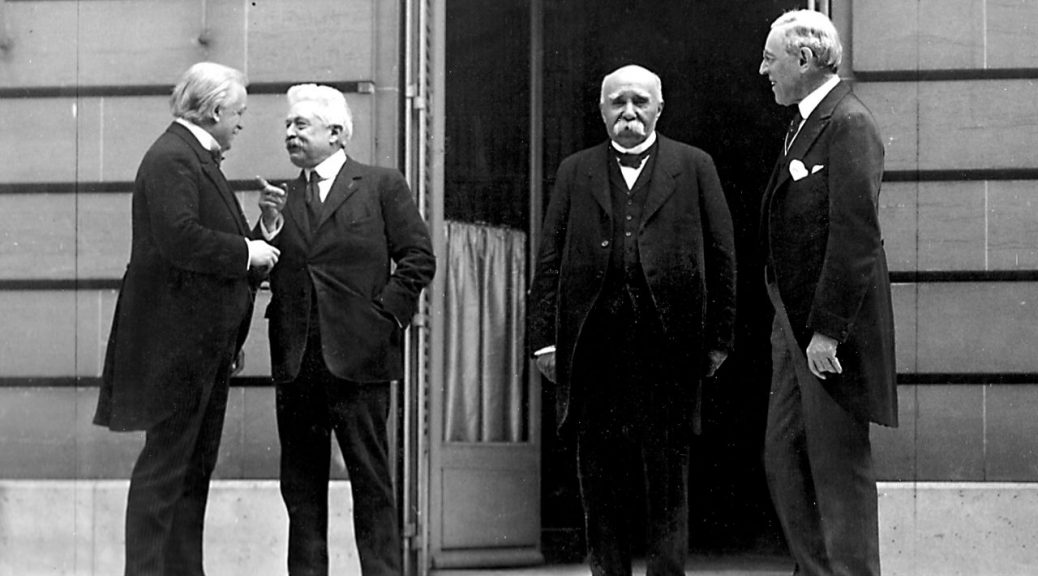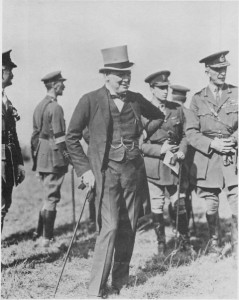
“Squeeze Germany until the Pips Squeak”
Writing in the Arizona Republic, Clay Thompson properly corrects a reader. It was not Churchill who coined the phrase, “we shall squeeze Germany until the pips squeak.” Mr. Thompson correctly replied that the author was likely Sir Eric Campbell-Geddes, First Lord of the Admiralty in 1917-19. No sooner had Geddes uttered it than the line was ascribed to Prime Minister David Lloyd George. It worked well in the 1918 British general election, which Lloyd George handily won.
Lloyd George was personally not revenge-minded. But as a politician he was all too ready to adopt the popular cry “Hang the Kaiser.” (Punishing the Kaiser was resisted by very few besides Churchill. A dangerous vacuum, Churchill warned, might occur if the Hohenzollerns were deposed.)

Churchill, as Thompson says, criticized severe retribution against Germany at the time. He continued to say so in The World Crisis, his memoir of World War I. He was true to his maxim, “In victory, magnanimity.” As Secretary of State for War in 1918-19, Churchill argued that the Allies should ship boatloads of food to blockaded Germany after the Armistice. Lenient terms, he added, should be offered the defeated enemy.
Squeezing Germany
“Squeezing Germany until the pips squeak” was a good vote-getting slogan, but it is too sweeping to say that the peace of 1919 led directly to Hitler. As the historian R.J.Q. Adams wrote:
Britain required a restored Germany, returned to economic stability…. Though defeated, Germany remained a unified vital nation of more than 60 million souls who had fought the British and French to a standstill on the western front for more than three years. Her recovery, regardless of the desires of her former enemies, was virtually inevitable. It is not difficult to see why there were many to whom appeasing such a nation was attractive.
“Squeezing” was the advertised approach, at least in public, of most Allied leaders. It committed Germany to vast reparations, contributing (but not solely causing) an economic collapse in the 1920s. We should not however overrate this. The Germans paid many millions in reparations. But they also received about 50 percent more than that in US loans.
Of course it can be argued that without the drain of reparations, the German state would have been better able to withstand postwar economic chaos that led in due course to Hitler. But other aspects of the treaty were also questionable. For example, Churchill argued that the return of Germany’s forfeited colonies, was a realistic form of appeasement.
Thanks to Clay Thompson for puncturing this particular instance of “Churchilllian Drift.”







6 thoughts on ““Squeeze Germany until the Pips Squeak””
Replying to David, below: Well, the 1871 treaty of Frankfurt just took away a region of France called Alsace-Lorraine which had been German-speaking since the fall of the West Roman Empire. Furthermore, a huge chunk of the 3.8 billion gold franc war indemnity due to be paid by France was offset by counting French canals and railways as well as other infrastructure in Alsace-Lorraine.
–
And the treaty of Brest-Litovsk saw no indemnities at all. It was supposed to give freedom to the non-Russian peoples of the fallen Russian Empire, ending the threat to Germany from the east. Nothing more. However, in the years from 1918 to 1921 the young Soviet Union managed to reconquer Ukraine and Byelorussia (except for the western parts which went to Poland in 1920), the Caucasian Republics, as well as ex-Imperial Russian Central Asia. Soviet attempts, undertaken in the same period of time, to re-take Finland, the Baltic states and Poland came to grief, however.
–
German indemnities after WW1 amounted to 132 billion gold marks. This might have been doable, had the victors not insisted on being paid in gold or in their own currencies. That was unfortunately impossible with German goods being de facto excluded from their former export markets with the help of exorbitant tariffs.
–
In my humble opinion, Deighton is possibly neither a liar nor an idiot, but Germanophobes such as he score guilty on both counts all too often.
Of course the economic problems of Germany were a factor in the rise of Communism and Nazism there. But the humiliations of the Treaty and of Danzig (Gdansk) upon a proud population and their language and culture contributed mightily to Hitler’s rise. Indeed without the votes of northeast Germany, Hitler may never have gained power. Restrictions on the military were humiliating too. But since there was no permanent Allied occupation, the Germans were able to cheat almost from the very beginning and develop their air force, 88 guns, U-boats, etc. Reparations per se did not cause Hitler, but the Versailles Treaty certainly was the fulcrum by which Hitler turned the German people into victims and posed as the true defender of “German rights” and “German pride.” Hitler understood the appeal of nationalism and the hurt pride of the German people, and exploited them to his benefit.
Not exactly. The words were by Eric Geddes, not Lloyd George, whose initial impulse was for a magnanimous peace. But as Charles Mee writes, “Squeeze Germany until the pips squeak” became the rallying cry of the 1918 British election, the Liberal Party’s popularity recovered, and “Lloyd George was ebullient.” 2) The real crusader for retribution was Alfred Harmsworth, Lord Northcliffe, and his powerful newspapers. Thrice rejected by Lloyd George for the cabinet Northcliffe had personal as well as political motivations for his strident advocacy.
Neither is it correct to say the British and French accept no blame for the retributive peace. Britain’s mistakes at the Peace Conference have been widely aired by historians, notably R.J.Q. Adams. French historians for their part have long criticised the French equivalent, post-1918 slogan, “L’Allemagne paiera!” (Germany will pay). Nor has Woodrow Wilson escaped blame, for the naivete that inspired too many of his impulses in the Peace Treaty. I have, however, modified the above post to suggest that harsh treatment of Germany was considerably mitigated by the USA, which loaned Germany more money than they had to pay in reparations. In short, this is a big, complicated subject, not conducive to sweeping generalizations.
And that was the opening shot that began the Second World War, which did not begin when Germany invaded Poland. It began when those words were uttered by an insane Welsh b——, David Lloyd-George. Woodrow Wilson did not know who he was dealing with at the Peace Conference. The British and the French still continue to believe they are innocent of any wrongdoing.
We can also say not resisting Hitler over the Rhineland was bad, but not resisting him at Munich was worse. Doesn’t make the former untrue.
“committing Germany to vast reparations and squeezing so hard they contributed to a German economic collapse in the 1920s, leading ultimately to Hitler.”
This has become such a standard of historical dogma that I thought that it might be a good idea to present an opposing view by a serious historian, discussing just this question:
“the treaty that finally emerged was not vindictive compared with Germany’s peace with France in 1871 or the terms Germany inflicted on Lenin’s Russia in 1917. In postwar Germany, politicians made much of the £1,000 million charged to Germany in reparations. Less was said about the £1,500 million loaned to her by Britain and the United States.” (Len Deighton, Blood, Tears and Folly, Pimlico, 1995, p. 133)
My first approach to this question would be to check Mr. Deighton’s numbers, but I haven’t got the time or inclination to even start on such a project right now.
Comments are closed.